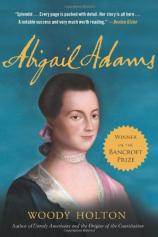Abigail Adams
Review
Abigail Adams
Abigail Adams is perhaps best remembered for requesting that her
husband, the not-yet-president John Adams, “remember the
ladies” as he helped forge a new government in 1776. This
famous private letter has turned Adams into a feminist icon, and
while here she may have been specifically referring to domestic
violence, in other letters she expressed what is often seen as a
progressive, enlightened view that women should be equally educated
with men and allowed to engage in business and control their own
finances. This aspect of Adams’s biography is well-known. But
less so are her conflicted ideas on religion, African-Americans,
money making, Europe, politics and family. In ABIGAIL ADAMS, by
American history scholar Woody Holton, readers are given a vivid
and complete picture of America’s second first lady.
Abigail Smith was born in Weymouth, Massachusetts in 1744, the
daughter of a parson. She was raised by her overprotective parents
but spent a lot of time with her more affectionate maternal
grandmother. Along with her brother and two sisters, she had a
typical childhood. She was atypical, though, in the sense that she
yearned for an education forbidden to her, one of science and
critical thinking in addition to literature and language. She
managed to find ways to more fully educate herself through the
study of languages and by reading whatever she could get her hands
on.
Just before her 20th birthday, she married John Adams, a lawyer
family friend nine years her senior. Though one would expect her
concern with education and worldly topics to end at that point, she
remained true to her belief that girls should be educated as boys
are and that women possess intelligence, reason and dignity.
However, as Holton shows, Adams was not a feminist by today's
standards. Her ideas of gender were complicated; she asserted that
education and business opportunities were important to girls and
women, but also believed that propriety, decorum and fashion were
important as well. Her own business dealings were often done behind
her husband’s back, and at times those dealings verged on
illegal. She was usually less than generous about African-Americans
and foreigners or immigrants in her private letters, though she was
always charitable and mostly kind.
It is the contradictions that make Adams so fascinating and
Holton’s book so interesting. This is not a romantic or
idealized view of this American icon, but an honest, refreshing
exploration of a remarkable woman who at once personified and
challenged the perceptions of women of her time and embodied many
of the changing mores and deeply rooted beliefs of the foundering
generation of the United States.
Adams’s tale gets all the more rich as she finds herself
moving up in the political world. She spends years in Europe as the
wife of a diplomat and comes home to be the wife of the first vice
president and second president of the new nation. But while the
politics and history are important, it is as a wife, sister,
daughter, friend, mother and thinker that Adams is most compelling.
And Holton does a terrific job explaining the ways in which she was
a product of her time and place and how she was unique and
trailblazing. The relationship between Adams and her husband is
tender and relatable and their exchanges surprising in their
language, passion and thoughtfulness. These sections often make for
some of the best reading in the biography.
Holton’s prose is at once light and scholarly; the details
and facts are clearly presented, but he lets the story unfold in an
entertaining way and allows the main characters to speak for
themselves, stepping in to elucidate, explain and occasionally
question the material.
ABIGAIL ADAMS is a must read for those interested in American
history but will find many happy readers among those who thought
historical biographies had to be stuffy or dull. Adams was a true
partner with her powerful husband, a well-read and outspoken
advocate for women, a financial risk-taker, and loving mother and
sister. Holton does justice to her life story.
Reviewed by Sarah Rachel Egelman on December 22, 2010
Abigail Adams
- Publication Date: June 1, 2010
- Genres: Biography, Nonfiction
- Paperback: 512 pages
- Publisher: Free Press
- ISBN-10: 1416546812
- ISBN-13: 9781416546818




